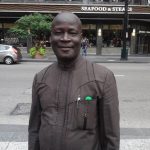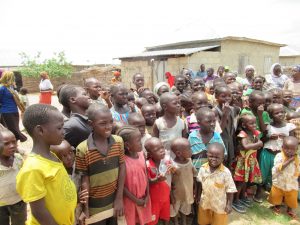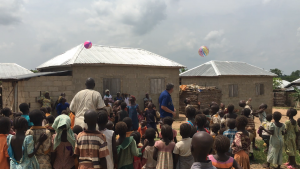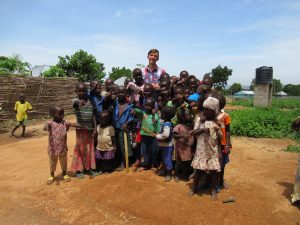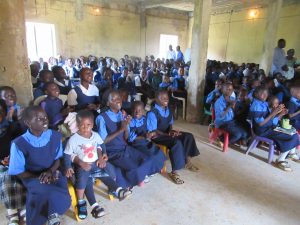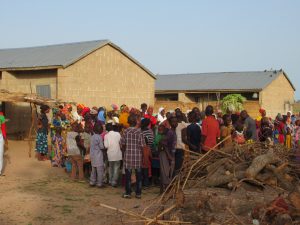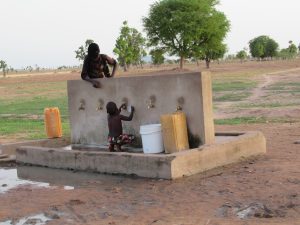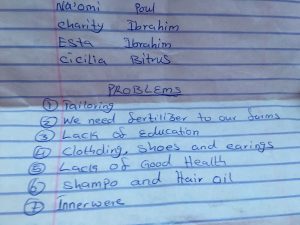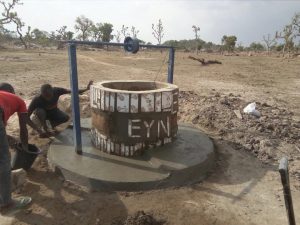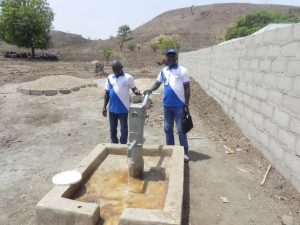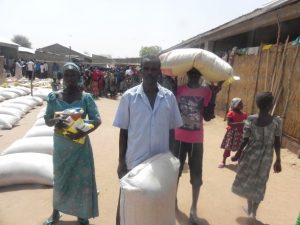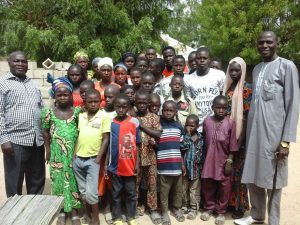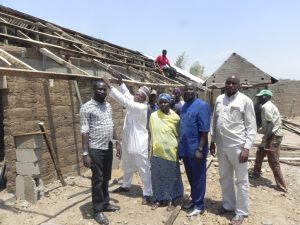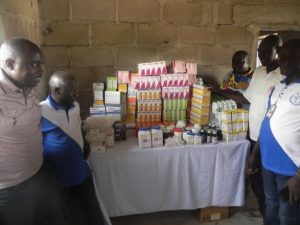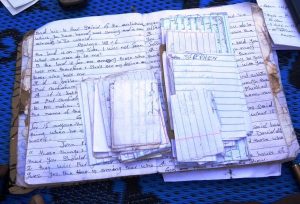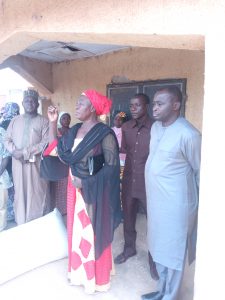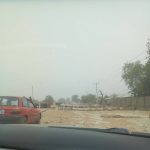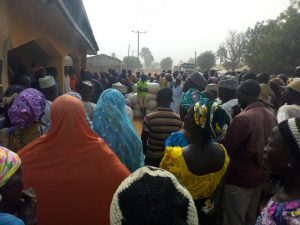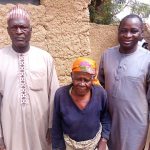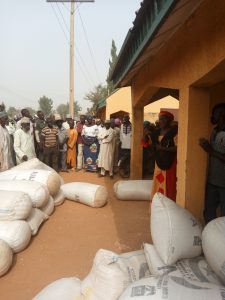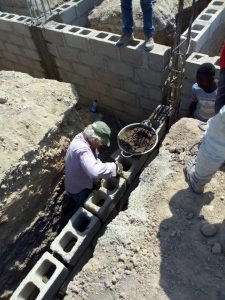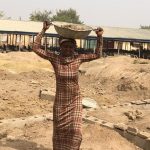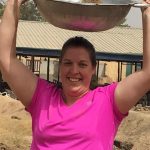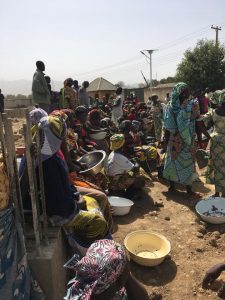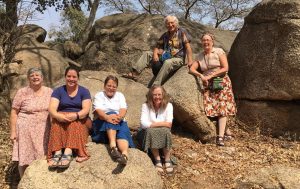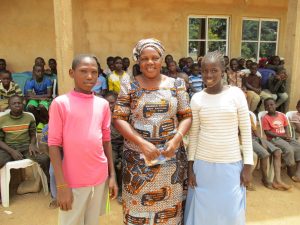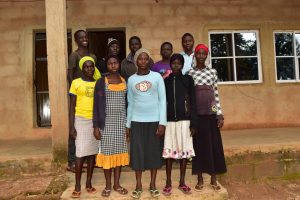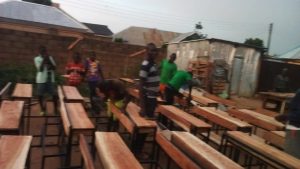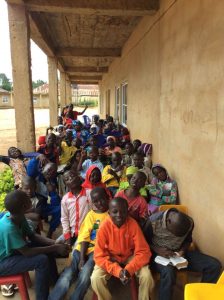by Nathan Hosler, director of the Office of Public Witness
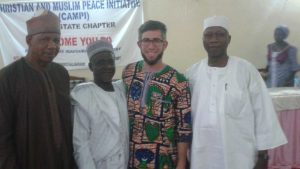
Christian and Muslim Peace Initiative (CAMPI) inauguration in Maiduguri. Photo credit: Silas Ishaya
2 Peter 3:8-15a
Isaiah 40:1-11
Anticipation. Waiting. Agonizing? Uncertain. Advent—waiting for the promised One. On Thursday, while I was in northeast Nigeria, we rose early for our 3-4 hour drive and hit the road. Rutted. Through dry, mostly flat land with low trees except for the palms. Security checkpoints with men with big guns and barricades. Road blocks of barrels or tires or logs at checkpoints which jut, maybe half way, into the road. These alternate—one from the left, right, left, right—which slows traffic. This traffic slowing strategy is also used through villages which are lined with market stands. This works-sort of- but at times it generates a certain careening as cars coming opposing directions navigate as quickly as possible. While we barreled through one such obstacle course a gas tanker kept pace with us leading our way, weaving wildly, looking a little like the Joker in Batman driving the tractor trailer. Then, passing Gombi, we tighten a bad sounding wheel before engaging the long smoother straightaways (regularly hanging at 85 miles an hour) to Yola and the airport. As a mere passenger rather than driver, I wait. Bracing myself, observing, talking—but waiting.
My last 5 in-country flights have been delayed but just in case this one isn’t we get there early enough. They aren’t boarding yet and aren’t even checking us in. So, I wait. It’d be nice to be productive, but the uncertain waiting is distracting. Once the check-in begins, it will be a scramble. Anticipation. Sort of poised, ready. No word on the delay, but that the harmattan dust in the air from the Sahara is too thick. Another flight arrives…hope is sparked. The airport assistant guy, Abdul, suggests I might want to get a seat on this flight. Wasn’t sure, but they were filled anyway when he checks. Maybe an hour or so later it is starting to get uncertain if we will get out before they shut down flights. I text him and ask for my paper ticket print-out so that I have it if he leaves. Not minutes later, they begin checking in. He makes a mad dash towards me across the empty room to retrieve the paper and dives into line. Our hope is restored. Anticipation. Checked in. Through security. Waiting. One hour. Maybe another. Text the Ambassador to say I’ll probably miss our meeting.
Then high above, through a strangely garbled PA system, something is announced. Through deciphering or sleuthing we learn that the flight will arrive from Abuja by 5:50 pm (flight was to depart by 12:15). Relief. Hope at the first bit of information passed on to us in 6 hours—the masses who wait. 5:45. 5:50. This is the story of Advent. Of the waiting and expectation of the coming Messiah who will free the captive, heal the blind, cast off the oppressor, and proclaim reconciliation with God.
Another slightly less garbled but still incomprehensible announcement. A young messenger of doom walks around and confirms. The flight has been canceled. Which means I also miss my flight home.
At the time of writing parts of this I remain in the anticipation of both Advent and getting a flight home. Though we are still weeks from the coming of Jesus, we may remember from last year that we will not be disappointed. The messengers will not be my young airport messenger of doom but the angels to the shepherds. But that is getting ahead of where we are today. Today we wait.
Our passage is 2 Peter 3:8-15a.
8 But do not ignore this one fact, beloved, that with the Lord one day is like a thousand years, and a thousand years are like one day.
The passage begins by challenging our notions of God’s time and patience. If 1000 years = a day for God, then what does that break down to per minute? Per second? However, if a day is like a thousand years then what does that mean as the reverse? This sounds less like a common math problem (unless of course this is what one learns if one majors in math) and more like the Matrix or Inception, movies in which time and space bend in unusual ways. This is not simply asserting that God experiences time in a very accelerated or very slow manner.
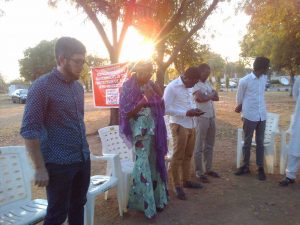
Photo Credit: Nathan Hosler
This number 1000 came back to me this week while I was at the daily—that is every day at 5:00 at the Unity Fountain next to the Transcorp Hotel in Abuja—vigil marking the abduction of the school girls from Chibok. This past Monday was 1330th day. Today, Sunday December 10th, is 1336 days. How has God experienced these days? There is some old-timey philosophy that Christians have occasionally been influenced by that states that the divine must be above change and above being influenced by the merely human. Our God, however, (which is most scandalous), becomes incarnate and joins us in our existence and joy and pain.
That Jesus is coming (since we are in advent we refer to it in the future) and will show up in this world as God incarnate—God having taken on flesh and blood and pain and joy—that this is our God then means that God has not been distant from us nor the school girls of Chibok these 1336 days. Jesus came healing and serving and feeling and calls us to the same—or should I say, will call us to do the same once he is born.
Jesus, and thus God, is not above pain and the agony of the kidnapped and their families but with them. God is with us. God is with you. This is a type of hope. The passage continues on, expounding on the timeliness of God.
9 The Lord is not slow about his promise, as some think of slowness, but is patient with you,[a] not wanting any to perish, but all to come to repentance.
The Lord is not patient out of lack of concern but as an act of mercy. The act of mercy which allows for repentance. This call to repentance is both urgent and marked by delay. Delay for repentance and turning. There are many horrible things in this world. I noted the Chibok Girls. There have been many others. Dr. Rebecca Dali has, during her work of humanitarian relief, collected some 4,000 names, dates, and locations of people abducted.
On my flight back from Maiduguri I was wearing my Office of Public Witness t-shirt. On the back is our tag line—“Seeking to live the peace of Jesus publicly.” The man sitting beside me said he liked it…it turned out that he was EYN. We talked for the whole flight to Abuja about his research in public health and how people cannot access it. Towards the end I learned he has 4 children. The youngest is a boy and named after his father. Even later in the flight he revealed that his father had been kidnapped and killed. Not by Boko Haram but by the Nigerian military.
So, when the Office of Public Witness works with the Nigerian Working Group which we convene on military accountability and human rights, raising concerns about the sale of weapons by the US, it is not an abstract thought. It is not a sterile appeal to theoretical legal frameworks, which are useful and regularly used, but it is because we follow a God who feels the pain of people and calls us to a ministry feeling this pain—and then acting in response. God’s patience is for repentance. God’s patience is for repentance. Jesus, the one whose birth we anticipate in advent, is the embodiment of this justice.
10 But the day of the Lord will come like a thief, and then the heavens will pass away with a loud noise, and the elements will be dissolved with fire, and the earth and everything that is done on it will be disclosed.
Note that this dissolving is not simply destruction but a process of revealing. It is a disclosing of acts done. Because of this we should live accordingly. Because of this we can also trust that acts of injustice will be brought to light.
11 Since all these things are to be dissolved in this way, what sort of persons ought you to be in leading lives of holiness and godliness, 12 waiting for and hastening[c] the coming of the day of God, because of which the heavens will be set ablaze and dissolved, and the elements will melt with fire? 13 But, in accordance with his promise, we wait for new heavens and a new earth, where righteousness is at home.
Where righteousness is at home. Righteousness can also be translated justice. “We wait for a new heavens and a new earth, where justice dwells”
14 Therefore, beloved, while you are waiting for these things, strive to be found by him at peace, without spot or blemish; 15 and regard the patience of our Lord as salvation.
Because of this being made known—this revealing work—we recognize that that this is good news for those on the side of justice. However, it is concerning for those who are not. Advent is the marking of the coming of Jesus—the justice of God. This is the good news that the angels will proclaim. While this is concerning for some—which may be us—we should consider the patience of the Lord as our salvation. So, this coming and revealing is good news for both the just and unjust for both the righteous and unrighteous.
The patience of God leaves room for repentance. This is not the same as those clergy whom Dr. Martin Luther King Jr. rebukes. It is not patience in the face of wrong. There is both a patience leading towards repentance and an impatience with abuse. “everything with be disclosed” in the last day–God reveals what is hidden and brings to justice.
Comfort, O comfort my people,
says your God….
3 A voice cries out:
“In the wilderness prepare the way of the Lord,
make straight in the desert a highway for our God.
4 Every valley shall be lifted up,
and every mountain and hill be made low;
the uneven ground shall become level,
and the rough places a plain.
5 Then the glory of the Lord shall be revealed..
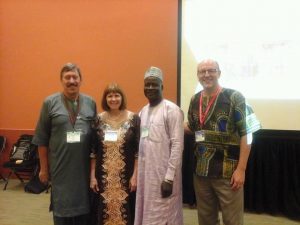
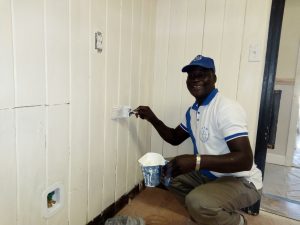 I learned the commitment, willingness, sacrifice and humility of the volunteers.
I learned the commitment, willingness, sacrifice and humility of the volunteers.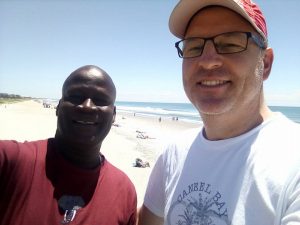 After visiting the Ocean and an Aquarium, we continued with our journey to Maryland. I was first shown the Church of Brethren, where Roy worships. Then the next day, Thursday, 12th July 2018, we visited New Windsor. I was taken round by Roy to the School building which was formally Brethren Service Center property. I was shown where containers are received, from there we went around the warehouse and offices where I met with all volunteers and staff. It was amazing how things are well organized, volunteers are working with joy in their hearts, most especially, the man that is handling the machine for packaging of clothes. After that we had a meeting with Disaster Staff, (Jenn, was absent but she participated through Skype call). I was given the opportunity to share about our work in Nigeria and my story. After our meeting, we went to celebrate our work and my coming to the BSC at a restaurant (Hibachi) with a fantastic demonstration.
After visiting the Ocean and an Aquarium, we continued with our journey to Maryland. I was first shown the Church of Brethren, where Roy worships. Then the next day, Thursday, 12th July 2018, we visited New Windsor. I was taken round by Roy to the School building which was formally Brethren Service Center property. I was shown where containers are received, from there we went around the warehouse and offices where I met with all volunteers and staff. It was amazing how things are well organized, volunteers are working with joy in their hearts, most especially, the man that is handling the machine for packaging of clothes. After that we had a meeting with Disaster Staff, (Jenn, was absent but she participated through Skype call). I was given the opportunity to share about our work in Nigeria and my story. After our meeting, we went to celebrate our work and my coming to the BSC at a restaurant (Hibachi) with a fantastic demonstration.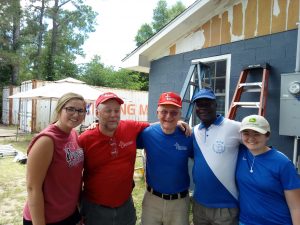 These are some of the Lessons Learnt from the visit:
These are some of the Lessons Learnt from the visit:

